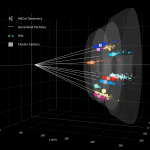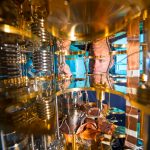Scientists working on experiments at the LHC are continually refining our understanding of the fundamental constituents of our universe. Every measurement, every new, uncovered facet of a subatomic particle comes only after a thorough and rigorous analysis of the data. The way they access that data may soon get an upgrade at Fermilab, where CMS collaborators recently installed a new solid-state technology at its computing facility. The technology will complement the standard spinning-disk hard drives that have been the dominant computer storage devices for the last several decades.
computing
From Inside HPC, Oct. 14, 2020: With the arrival of exascale computing in 2021, researchers expect to have the power to describe the underlying properties of matter and optimize and control the design of new materials and energy technologies at levels that otherwise would have been impossible. Fermilab scientist Andreas Kronfeld talks about how participation in DOE’s Exascale Computing Project can help solve complicated calculations in particle physics.
From Argonne National Laboratory, Aug. 5, 2020: The U.S. Department of Energy’s Advanced Scientific Computing Research Leadership Computing Challenge has awarded 24 projects a total of 5.74 million node hours at the Argonne Leadership Computing Facility to pursue challenging, high-risk, high-payoff simulations. Fermilab scientists Andreas Kronfeld and Igor Rakhno are among those who have been awarded time on the facility’s Theta supercomputer.
From the University of Chicago, May 12, 2020: A round of AI + Science grants awarded by the University of Chicago’s Office of Research and National Laboratories Joint Task Force Initiative supports new AI applications to boost scientific discovery and education. Awardees include Fermilab scientists Brian Nord, Charles Thangaraj and Nhan Tran.
From Physics World, April 3, 2020: A collaboration that includes Fermilab scientists is exploring how quantum computing could be used to analyze the vast amount of data produced by experiments on the Large Hadron Collider at CERN. The researchers have shown that a “quantum support vector machine” can help physicists make sense out of the huge amounts of information generated at CERN.
One of the most difficult problems to overcome in developing a quantum computer is finding a way to maintain the lifespan of information held in quantum bits, called qubits. Researchers at Fermilab and Argonne National Laboratory are working to determine whether devices used in particle accelerators can help solve the problem. The team will run simulations on high-performance computers that will enable them to predict the lifespan of information held within these qubits using smaller versions of these devices, taking us one step closer to the age of quantum computing.
Spack, a software package management tool, was recognized with an R&D 100 Award in November. Developed for high-performance computing applications, Spack is used as an end-to-end development tool within the high-energy physics community. Fermilab is a contributor to Spack, whose initial development was led by Lawrence Livermore National Laboratory.
From Inside HPC, Sept. 15, 2019: Argonne and the National Center for Supercomputing Applications use deep learning to analyze Dark Energy Survey data.





